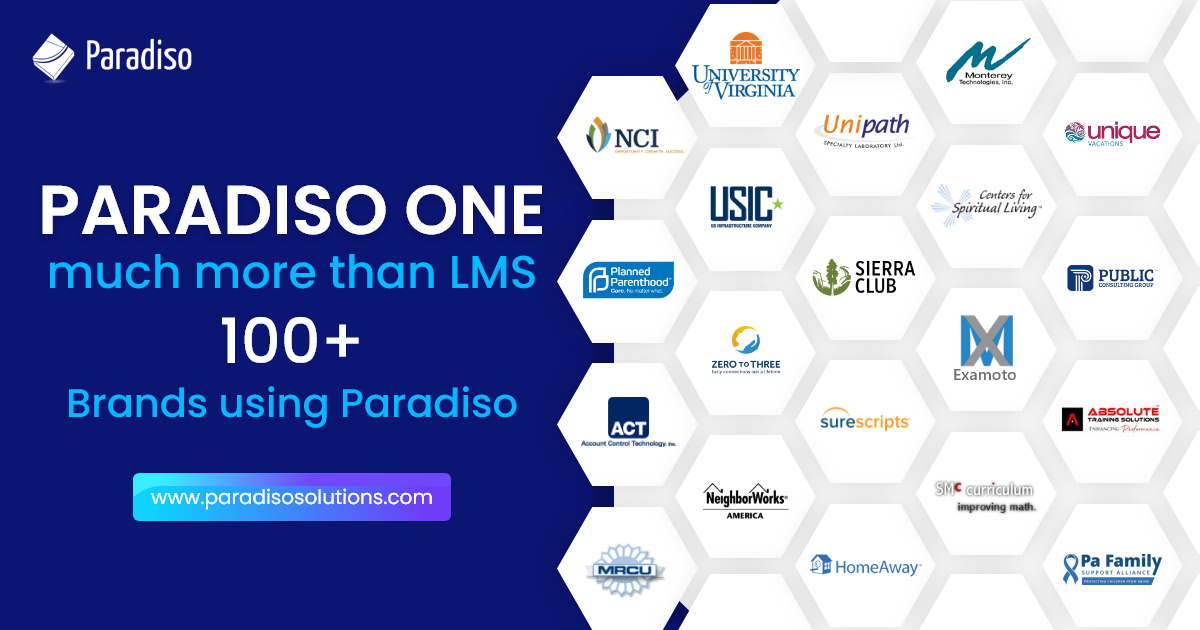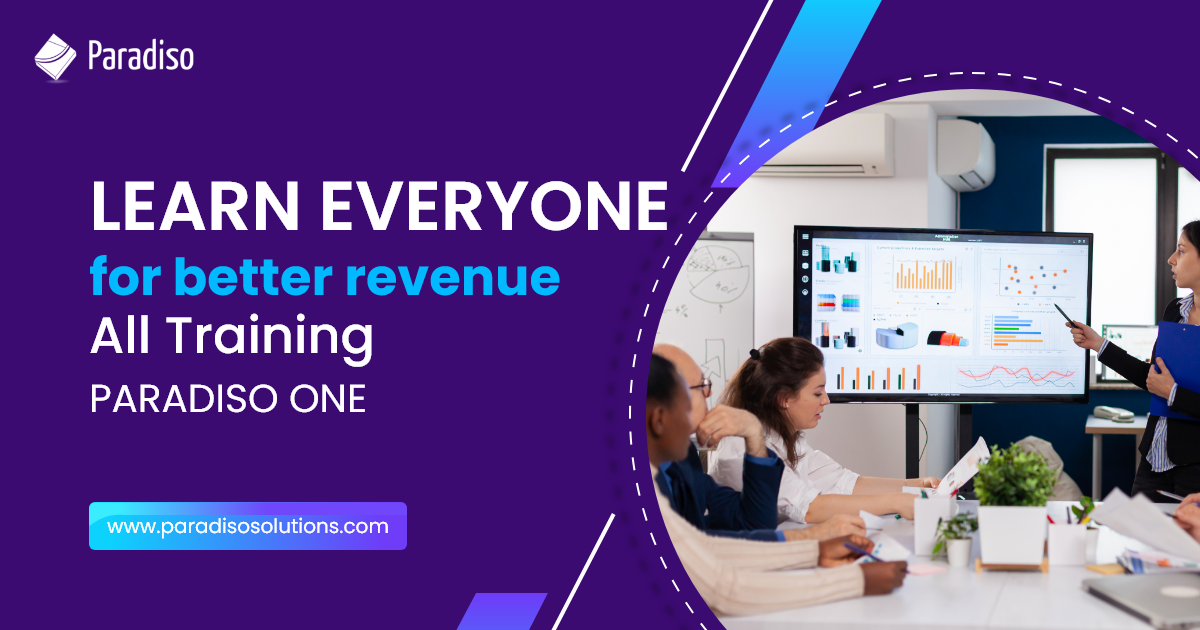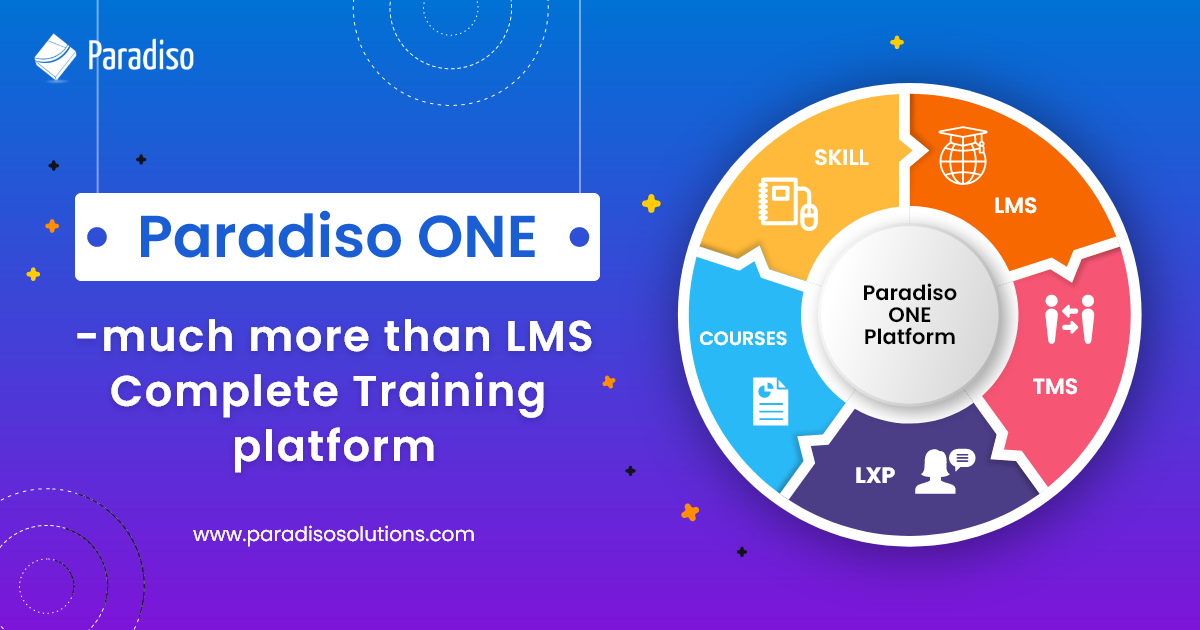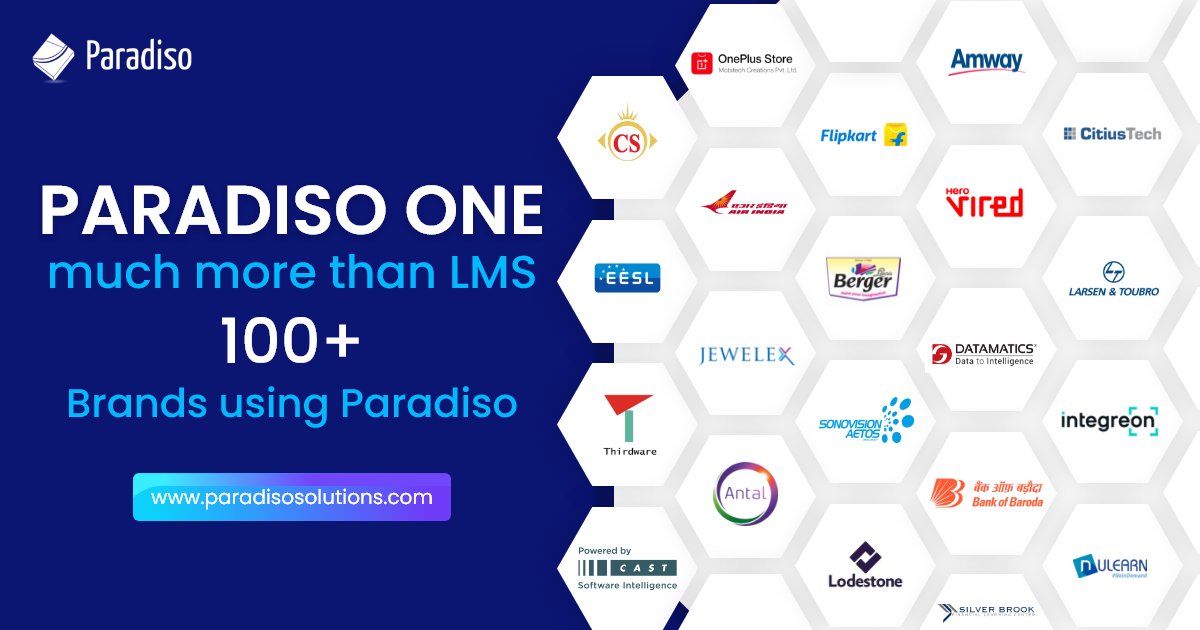Brief
Paradiso Solutions is a global IT company providing end-to-end software solutions for competitive business needs. Paradiso offers robust eLearning solutions, and Paradiso LMS is the top-performing feature-rich online learning platform in the market globally. The Learning Management System provides a seamless learning experience with 100+ integrations that make learning a breeze.
Paradiso Learning Management System offers outstanding features such as gamification, social learning, blended learning, learning path, performance reports, etc. The online learning platform is fully customizable and offers tools like virtual classrooms, web, and video conferencing for higher learner engagement. If you are looking for a highly skilled and streamlined workforce, Paradiso LMS is the go-to software for your business's success.
Overview
The Paradiso Learning Suite empowers enterprises to leverage technology to create, deliver and understand the business impact of their learning programs. With the multi-product learning suite, organizations can tackle any learning challenge and create a true learning culture within the company.
The benefits of the Paradiso Learning Suite include:
- Flexible learning methods – Users can pick from instructor-led training (ILT), classroom training, virtual training, and online training, or use a variety of formats for a blended learning environment. They can track in-person training in different locations. The solution also offers tools for assigning courses, monitoring performance, and managing classroom schedules.
- The ability to publish content in multiple formats– It supports all major e-learning formats, such as SCORM 1.2 and 2004, AICC with PENS support and Tin Can (xAPI), which enables users to upload any files and embed video content from Wistia, YouTube, and Vimeo.
- Customizable platform – Users can take advantage of customization options (e.g., branding, logos, custom domains) to provide a uniquely designed platform, so they can create a consistent experience for internal use or white label the software for customers and partners.
- Tools to measure training impact – This software helps users gain insight into learning trends within the organization by using reports and dashboards for enhanced analysis. It comes with pre-built reports or organizations can build their own by configuring user data and course fields. The software also provides configurable dashboards that allow users to view KPIs. In addition, there are dashboards specifically for learners to track their progress. Reports are customizable for each audience based on the needs and goals of each.
- Mobile learning – The platform has an app for iOS and Android devices, optimized for different screen sizes to provide a smoother user experience. Learners can continue learning offline and any progress made will sync with the system once they go back online. It can also help consolidate several LMSs into one.
- User-friendly interface – Docebo provides an intuitive interface on both the front-end and back-end. Users can choose which apps they need. It’s also possible to add more as needs change, which eliminates having too many apps to start. It allows users to customize the UI and include the capabilities required for user profiles.
- Extra capabilities – Users can get more out of the software by adding something like an audit trail, a blog, coaching, enrollment rules, labels, a MOOC builder, and custom domains by integrating with specific third-party applications.
- Global learning support – It includes 40 out-of-the-box languages along with localized date formats. This helps cut down on implementation time and boost user adoption. It eliminates the need for multiple systems to deliver internal and external (employees, customers, and partners) enterprise learning programs.
Highlights
- Learning management: The system supports automated actions, such as enrolling or assigning users based on preset criteria and deactivating users at a set time. In addition, there are over 70 notification templates that are delivered within the platform or to an inbox for real-time updates and alerts. DomainKeys Identified Mail (DKIM) authentication ensures that all notifications reach the intended inbox. A repository helps users search for and modify learning objects, such as SCORM, Tin Can, AICC, slides, PDFs, videos, HTML, LTI, Google Drive, and screen or webcam recordings. The changes are applied across all instances of the object, which eliminates duplication errors and streamlines the experience.
- Gamification: Badges, awards, and points are among the elements included, and leaderboards and contests help increase the retention of the material. Learners can use points to buy rewards in a marketplace. Users can create separate leaderboards and awards for each learning branch on the platform.
- Social learning: The Discover, Coach & Share function gives users access to information by asking questions and finding answers with their peers and internal SMEs. It facilitates social learning throughout the workflow. The learners and subject-matter experts at a company supply the user-generated information, and A content curation engine lets learners identify skills to improve and content to support growth. Supported by AI, Discover, Coach & Share suggests related content for a more effective, targeted experience. Users can create playlists for the content they want to revisit. The tool connects with Screencast-O-Matic to support the generation of video content.
- Content marketplace: Admins and learners can access and buy thousands of e-learning courses from Paradiso Content and its partners, which include LinkedIn Learning, Skills, and OpenSesame. Users can assign learners to specific programs or allow them to choose which content to study (OpenSesame doesn’t support learner selection). Content catalogs are available in two plans.
- E-Commerce: A plug-in for course catalogs provides a user-friendly browsing experience for selling online content. The system supports wire transfer payments, which simplifies the selling process by removing the need to manage currency, compliance, or other payment gateways. However, it also connects with payment gateways like Stripe and PayPal for international use. Users can bundle plans using different factors and set up an online store by using an in-platform storefront or integrating with Shopify or a CMS.
- Pages: The platform has a drag-and-drop interface for designing the user experience. A variety of page templates and widgets act as the building blocks for the learning platform, and the interface allows users to preview the layout before saving it. Users can also configure menu and page visibility using different criteria to provide customized learning paths.
- Mobile app: Learners can take training courses while offline and their progress is tracked and synced later. The app also has social learning capabilities so users can share content from the field and get an expert or peer feedback. Companies can brand the app and publish it as their own in the Apple Store, Google Play store, or their own Apple Enterprise store.
- Compliance: This feature lets admins create reports to make sure data is trustworthy, accurate, compliant, and secure, which is useful for audit trails and other reports.
- Certification and retraining: The software can set dates when certifications expire, and learners can also manage renewals and know when it’s time to complete the next session.
- Empowers power users: With this feature, admins can delegate rights to managers while retaining control from the central solution.
- White-labeling and customization: The platform facilitates branding through the use of custom domains, logos, login pages, layout, and navigation for each audience.
- Observation checklists: Users can monitor employee learning progress or compliance requirements with a checklist.
- My Team: Managers can see an at-a-glance view of team activities, such as deadlines, assignments that are due, and learning content that may be beneficial for their team members.
- Integrations: The solution can integrate with APIs and other systems, such as CRMs, HRISs, SSOs, content authoring, and web conferencing. Some specific software includes Elucidat, Google Analytics, Google Drive, 3. X, Optimizely, Salesforce, Shopify, Slack, Vivocha, and WordPress.
Usage
Paradiso powers the learning technology needs of more than 2,000 companies in 68 countries around the world. It’s ideally suited for small-medium-large enterprises (100+ users) that require an innovative and highly-scalable enterprise learning technology solution for their employees, partners, and customers.
Support
Users can access the knowledge base for issues and questions, as well as submit a support ticket request. They can also ask questions and get ideas from other users, Learning and Development experts, or Docebo staff via the Docebo Community forum.
Clients on the Enterprise plan have a dedicated Customer Success Manager who can help them beyond tech support, such as tracking that usage of the Docebo Learning Suite aligns with the client’s goals, mapping out specific use cases, or receiving feedback on issues or new features requests.
Categories
Pricing
Help Documentation

ESDS Software Solution LTD.
B-24 & 25, NICE Industrial Area
Satpur MIDC, Nashik 422007






